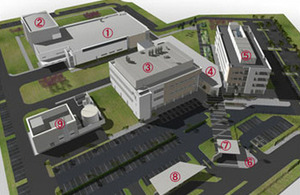MHRA helps Japanese pharmaceutical company to develop its first European site
It is hoped that the single site will help to improve the lives of patients and their families by developing medicines as quickly as possible.

Eisai’s European Knowledge Centre
The Medicines and Healthcare products Regulatory Agency (MHRA) has helped Eisai, a leading Japanese pharmaceutical company, to develop its first European site.
The third case study, published today, illustrates how MHRA advised on the regulatory requirements Eisai needed for the innovative concepts and design philosophies they wanted to employ in the development of Eisai’s European Knowledge Centre.
It is hoped that the single site will help to improve the lives of patients and their families by developing medicines as quickly as possible.
Mark Birse, MHRA GMDP Group Manager Inspections, Enforcement and Standards said:
“It can be tricky to balance the desire to employ innovative features in site development with the need to meet regulatory requirements. At MHRA we understand this tension and we work to help companies push the boundaries, but crucially within the parameters of safe and secure regulation. Our Innovation Office is the best way to access the information and guidance you need to save time, money and to safeguard your investment in the UK.”
MHRA helped in a number of ways:
- attending advisory meetings to facilitate quick decision making
- reviewing the conceptual approach to make sure it was on the right track
- providing invaluable feedback at an early stage, helping Eisai to mitigate risk and avoid expensive changes to design later on in the process
- working to support Eisai in ensuring compliance
Alex Felthouse, Director of Engineering and Production Services, Eisai said:
“Establishing a presence in Europe was of strategic importance to us. Involving the MHRA Inspectorate early on in the design of our flagship research and production site really helped us to make sure we were developing something that was within the regulatory parameters for this type of site, particularly as we were planning to build in a variety of innovative features. We were able to access guidance and advice quickly and easily as the project developed, helping us to minimise risk and the potential for expensive and time-consuming changes to the site.”
Background
- The case study is the third in a series to be released by the Innovation office at MHRA. The IO has been developed with the Medicines Manufacturing Industry Partnership (MMIP.) MMIP, which was launched by the Association of the British Pharmaceutical Industry (ABPI) and the BioIndustry Association (BIA) earlier this year, brings the UK’s medicines manufacturing industry together to create an attractive and innovation-rich environment to drive UK competitiveness and to build international recognition in medicines manufacturing.
- The Innovation Office, launched in March 2013, is one of the ways MHRA supports the Prime Minister’s Life Science’s strategy. It was designed as a place people developing medicines and devices can turn to if they do not know who to contact for advice in MHRA and it coordinates advice within MHRA. This strategy calls for the encouragement of life science industries as a future growth area for the country. It is designed to help companies overcome barriers and it creates incentives for the promotion of healthcare innovation.
- Please contact MHRA’s innovation office for enquiries.
- MHRA is responsible for regulating all medicines and medical devices in the UK by ensuring they work and are acceptably safe. Underpinning all our work lies robust and fact-based judgements to ensure that the benefits justify any risks. MHRA is a centre of the Medicines and Healthcare Products Regulatory Agency which also includes the National Institute for Biological Standards and Control (NIBSC) and the Clinical Practice Research Datalink (CPRD.) MHRA is an executive agency of the Department of Health.